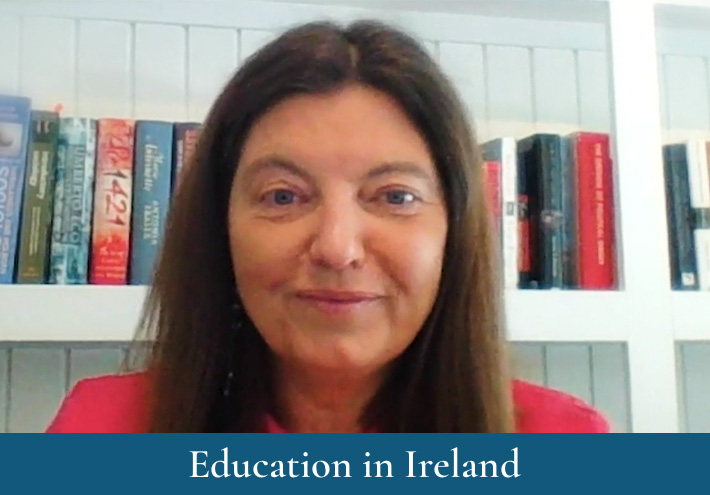

Introduction
Ireland has long been recognised as a global leader in the education field and Irish pupils perform in the top sectors in international studies such as the Organisation for Economic Co-operation and Development (OECD) PISA evaluations. Employers, both national and international, affirm the quality of graduates from the Irish education system. While academic success is extremely important, it is worth noting that the primary goal of the Irish education system is to provide a broad spectrum of cultural, artistic, sports, psychological and spiritual development as well as prepare for academia. In doing so educational programmes at primary and secondary levels are designed to fulfill and develop a wide array of talents and to support childhood development both mentally, artistically and physically.
The Irish Government sees education as strategically interlinked with national planning and have successfully developed programmes at all levels to establish Ireland as an international base for technology, science and financial services. There is a current campaign within schools to promote STEM subjects (Science, Technology, Engineering and Maths).
Education is compulsory in Ireland for children between the ages of six to sixteen, or until they have completed three years of secondary school education. There is state-funded education available at all levels unless of course a parent would like to send their child to a private school. Pre-school education, is usually catered for by private childcare facilities and a government-backed scheme provides free Early Childhood Care and Education for all of those in that age category.
Primary
The Irish primary school system, where students usually attend up to the age of twelve, is extremely child-centred and based around the concept of collaborative learning.
Although children are not obliged to begin education until the age of six, almost all 5-year-old children are at school. Primary education consists of an eight year cycle: junior infants, senior infants, and first to sixth classes. In Ireland all children are entitled to free primary education.
The primary curriculum aims to provide a broad learning experience and encourages a rich variety of approaches to teaching and learning that cater for the different needs of individual children. The primary curriculum is designed to nurture the child in all dimensions of his or her life—spiritual, moral, cognitive, emotional, imaginative, aesthetic, social and physical. Standardised tests are used to measure a child’s reading and mathematical achievement, and to determine children’s progress in those areas. Information from the tests is important given the vital role of literacy and numeracy in enabling children to access the full curriculum.
Secondary
Second-level education consists of a 3-year junior cycle followed by a 2-year or 3-year senior cycle depending on whether an optional Transition Year is taken following the Junior Certificate examination.
The junior cycle provides the basis for post-primary schools to plan quality, inclusive and relevant education programmes with improved learning experiences for all students. The Junior Certificate examination is held at the end of the junior cycle in secondary schools. Students normally sit for the examinations after 3 years of education.
Transition Year follows the Junior Certificate or Junior Cycle examination. This year is free from formal examinations and allows students to experience a wide range of educational inputs, including work experience.
The traditional Leaving Certificate Established is a two-year programme that aims to provide learners with a broad, balanced education while also offering some specialisation towards a particular career option. Subjects are assessed by an examination paper and by additional assessment methods including oral and aural examinations, practical examinations and assessment of practical coursework at the end of the two-year programme of study. Performance in the examination can be used for purposes of selection into employment, and into further and higher education.
Ireland boasts a very high level of success from both its government funded public schools and from private schools. Some more prestigious schools include St. Columbas, Blackrock College, Alexandra College, Belvidere College, Castleknock College and The King’s Hospital school. In addition, there are a number if International Schools including the International School of Dublin where pupils come from over 20 different nationalities and there is year-round enrolment.
Third Level
Third-level education is made up of a number of sectors. The university sector, the technological sector and the colleges of education are substantially funded by the State. In addition there are a number of independent private colleges.
There are universities that are autonomous and self-governing. They offer degree programmes at bachelor, masters and doctorate level and include Trinity College Dublin, Dublin City University, University College Dublin, Maynooth University, University College Cork, University of Limerick and National University of Ireland Galway. In addition there are a number of private medical colleges such as the Royal College of Surgeons in Dublin.
The technological sector includes technological universities (TUs) and institutes of technology (ITs) which provide programmes of education and training in areas such as business, science, engineering, linguistics and music to certificate, diploma and degree levels. The Department of Education and Skills has overall responsibility for the sector. The Technological Universities Act 2018 allows institutes of technology to apply to become a new type of higher education institution with technological university status.
The colleges of education specialise in training for primary school teachers. Training for post-primary teachers is provided by a number of third-level institutions. In addition, there are colleges of education that specialise in the training of home economics teachers, teachers of religion and physical education teachers.